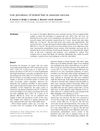General Characteristics of Hair in Eating Disorders
June 2012
in “
Springer eBooks
”

TLDR Eating disorders can cause various hair problems, and while hair loss in these disorders is linked to metabolic syndrome, treatment focuses on specific medications and lifestyle changes for the syndrome.
In the 2012 document, Marilyn Zabielinski and Antonella Tosti examined the impact of eating disorders on hair characteristics, finding that anorexia nervosa (AN) and bulimia commonly lead to conditions such as hypertrichosis lanuginosa (77% of 62 AN patients), telogen effluvium (67% of 122 bulimia patients and 61% of AN patients), and hair fragility due to nutritional deficiencies. They also reported hypopigmentation in severe malnutrition and trichotillomania in 5% of 1,453 patients with AN or bulimia. Obesity-related hirsutism was linked to excess androgens. The document also explored the connection between androgenetic alopecia (AGA) and metabolic syndrome, citing studies that found significant associations between the two, although results varied regarding insulin resistance. The authors concluded that hair characteristics are indicative of nutritional and hormonal imbalances and that while AGA is associated with metabolic syndrome, its primary treatments remain minoxidil and finasteride, with lifestyle changes recommended for metabolic syndrome.












